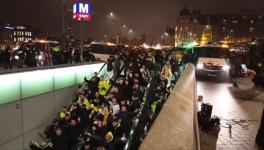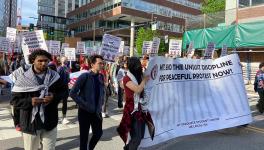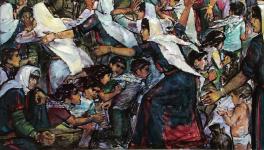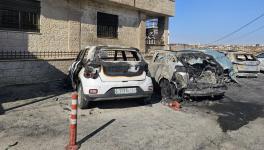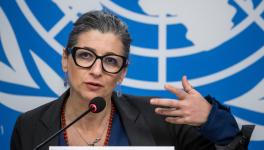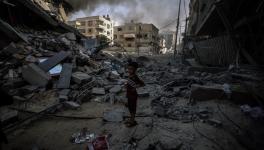The Ethnic Cleansing Of Jerusalem
Authors and artists attending the 2013 Palestine Festival of Literature were taken around Jerusalem, where they saw the multiple techniques being employed to ethnically cleanse the city. They crossed in from Ramallah through Qalandia checkpoint and met with people in the Old City, Sheikh Jarrah and smaller, surrounding neighbourhoods. This is what they saw.
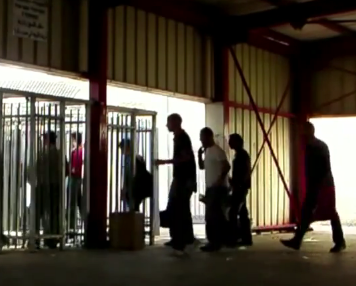
Transcript.
Tom Warner: The experience that most affected me was the checkpoint going into Jerusalem. You understand that these things exist before you come to Palestine but I don’t think until you have experienced, you don’t really quite understand the apparatus and the mechanism in place. One gets the impression that there is nothing accidental about the way these checkpoints work on your spirit. These are well thought out. They are intended to humiliate, intended to dehumanize.
Gillian Slovo: For example, we went through one of the checkpoints and one of our numbers set off the alarm as he came through because he was wearing a belt. He had to take off his belt and go through again. He set it off again. He had to take off his shoes. Fair enough you are looking for bombs. You have to do that. But then it followed. Three more of our numbers went through the same checkpoint and set off the alarm and they weren’t asked to take anything off because the soldier behind the checkpoint was tweeting or replying to emails on her phone at that time. That indicates to me that they don’t think there is a security situation going on. They are not really looking for arms or guns. What they are doing is putting people in their place and trying to stop free movement to withhold people. And that is something that I knew in theory but on experiencing it first hand, realized that it’s incredibly shocking what is going on here.
China Mieville: In East Jerusalem, we met up with some activists from an organization called Grassroots and they took us around the neighbourhood they are based which is being essentially eroded bit by bit from within by settlers taking over the houses.
Fayrouz Sharqawi (Grassroots Jerusalem): Sheikh Jarrah is the neighbourhood that embodies physically the policy of the occupation of Palestine, displacement of Palestinians and the Judaisation of the city. Here there are so many families that are under the threat of eviction from their homes into which Jewish Israeli settlers move in.
China Mieville: By far the most poignant, most affecting thing is that we were invited in by a woman whose house is threatened by extraordinary byzantine legal tangles that the Israeli state uses to repossess houses.
Fayrouz Sharqawi: I don’t know how familiar you are about this but after the Naqba, after many Palestinian owners moved out of Palestine, the Israeli authorities created a body called the Guardian of Absentee Property which was earlier known as the Guardian of Enemy Property. So this guardian is guarding the enemy property until the owners come back. Of course they won’t let the owners come back and you can do the math. And that’s how the Israeli authorities claim that this belongs to them. But it is very important to note that there are double standards and that the right of return is not granted to Palestinian refugees.
China Mieville: It’s not enough to fear that the house you have lived in all your life is about to be taken away. You have the added glaze of what feels very much like spying.
Omar El-Khary: In Jerusalem, far more than anywhere, there is a plethora of laws and bylaws and contradictory pick and mix approach to the law. Terms like ‘present absentee’ and contradictory laws and words that don’t make any sense in the normal world. You have families who have different documentation. Those with the blue I.D, those with Jordanian passports as well as blue I.D, those with Israeli passports, all this shows a clear intention to fragment and displace Palestinians from within. And it is not anything but Kafkasque. I mean it’s absurd.
Ray Dolphin (UN-OCHA): In terms of cutting off Jerusalem from the remainder of the West Bank, what happened in 1967 is that Israel had a census and the only Palestinians who were registered to live in Jerusalem were descendants. For example, for a Palestinian from East Jerusalem who wants to marry somebody from the West Bank, Bethlehem or Ramallah, there will be a problem. The Bethlehem or Ramallah spouse is not allowed to live in East Jerusalem unless they apply for something called Permanent Family Reunification which has been suspended from 2003 for security reasons. The alternative of course is for the Jerusalem spouse to go live in Bethlehem or Ramallah. But that too can cause problems. If the Israeli authorities find out that a Jerusalem resident is living outside Jerusalem, they can revoke their residency.
Omar El-Khary: To simplify, you have the clear violations of settlers coming in and uprooting families and taking over their homes and dividing areas up but you also have a kind of systematized way of slowly eradicating any Arab Palestinian presence in East Jerusalem.
China Mieville: Certainly, the Israeli state loves it when internationally it is able to show a film of soldiers removing settlers but compare that to the vast array of military hardware and strategy designed to clamp down on Palestine. Actually, there is no comparison. The idea of the state being any kind of mutual broker between these groups is, you would call it a joke but it is so far beyond funny.
Get the latest reports & analysis with people's perspective on Protests, movements & deep analytical videos, discussions of the current affairs in your Telegram app. Subscribe to NewsClick's Telegram channel & get Real-Time updates on stories, as they get published on our website.











